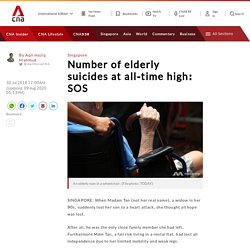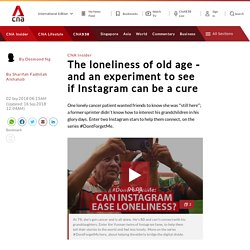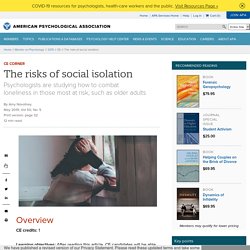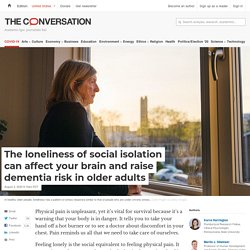

As these elderlies are undergoing late adulthood stage of retirement and seemingly comfort, there is a higher risk that they are being isolated and feeling lonely. In Singapore, it was reported that in year 2011, 9% of elderlies aged 65 and above are living alone and it affected their well-being negatively. We will now understand the effects of social isolation, the absence of social interactions, and how it can influence elderlies' development. Number of elderly suicides at all-time high: SOS. SINGAPORE: When Madam Tan (not her real name), a widow in her 90s, suddenly lost her son to a heart attack, she thought all hope was lost.

After all, he was the only close family member she had left. Furthermore Mdm Tan, a fall risk living in a rental flat, had lost all independence due to her limited mobility and weak legs. "Our care management team knew of her suicidal thoughts," senior social worker at Tsao Foundation's Hua Mei Mobile Clinic Jasmine Wong told Channel NewsAsia. So, staff from the organisation's counselling and coaching team provided her with psycho-emotional counselling and therapy, and worked with neighbours and community partners to support her daily living.
With Mdm Tan refusing to go to a nursing home, the staff made frequent visits to "reassure her that life has more to offer". But there are others who fall through the cracks. This is six cases more than 2016, when 123 elderly suicides were reported. However, SOS said fewer seniors are calling in. The loneliness of old age - and an experiment to see if Instagram can be a cure. SINGAPORE: One by one, her family and friends had died or disappeared, leaving her alone.

Isolated, Madam Wong Sok Ying could go for days without human contact, holed up most of the day in her one-room rental flat sparsely furnished with an arm chair, single bed, wardrobe, table and little else. “The TV is my best friend. No TV, I cannot pass the day. (I’d be) so lonely,” she said with a wry smile. “The radio is my friend, the newspaper is my friend. It is not as if she’s hungry for visitors. But there’s a grimmer reason behind her reluctance to socialise. In Singapore, the number of seniors living alone like Madam Wong has increased. Increased risks of mortality. The risks of social isolation.
Overview CE credits: 1 Learning objectives: After reading this article, CE candidates will be able to: Identify the effects of social isolation and loneliness on physical, mental and cognitive health.Explore how loneliness differs from social isolation.Discuss evidence-based interventions for combating loneliness.

For more information on earning CE credit for this article, go to www.apa.org/ed/ce/resources/ce-corner.aspx. According to a 2018 national survey by Cigna, loneliness levels have reached an all-time high, with nearly half of 20,000 U.S. adults reporting they sometimes or always feel alone. Such numbers are alarming because of the health and mental health risks associated with loneliness. "There is robust evidence that social isolation and loneliness significantly increase risk for premature mortality, and the magnitude of the risk exceeds that of many leading health indicators," HoltLunstad says. Who is most likely? Increased risks of physical health issues. The loneliness of social isolation can affect your brain and raise dementia risk in older adults. Physical pain is unpleasant, yet it’s vital for survival because it’s a warning that your body is in danger.

It tells you to take your hand off a hot burner or to see a doctor about discomfort in your chest. Pain reminds us all that we need to take care of ourselves. Feeling lonely is the social equivalent to feeling physical pain. It even triggers the same pathways in the brain that are involved in processing emotional responses to physical pain. Just like feeling physical pain, feeling lonely and disconnected from others is also a signal that we need to take care of ourselves by seeking the safety and comfort of companionship.
As scholars at the Center for Healthy Aging at Penn State, we study the impact of stress on the aging body and brain, including how it can worsen cognitive decline and risk for dementia. The health consequences of loneliness The COVID-19 pandemic has put many older adults’ social lives on hold, leaving them at greater risk for loneliness. Help me I m old How negative aging stereotypes create dependency among older adults. Increased risks of cognitive functioning and social withdrawal. Risks of Social Isolation, Loneliness, and Living Alone. Loneliness and social isolation during the covid19 pandemic. Tips on preventing social isolation and loneliness.